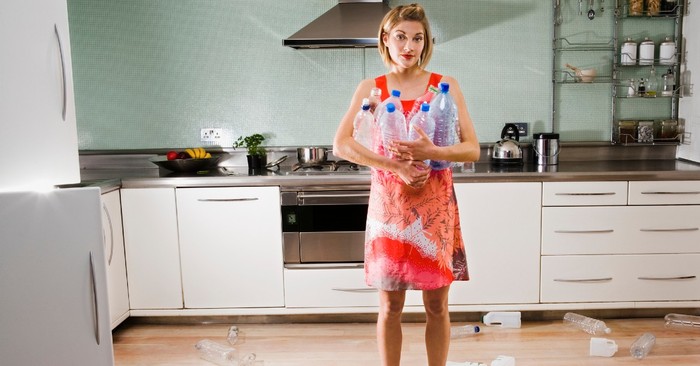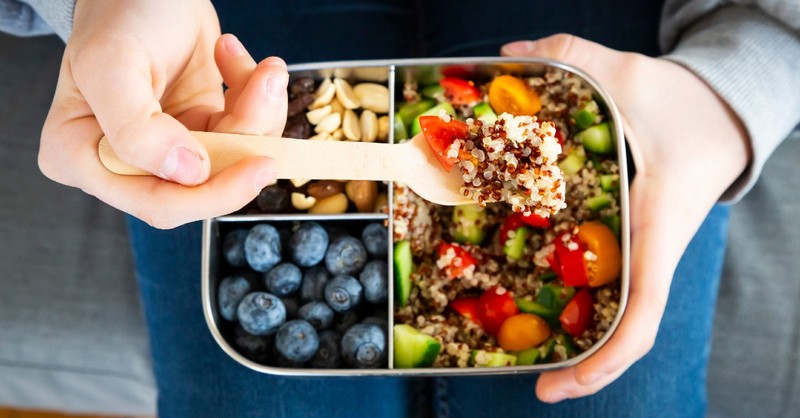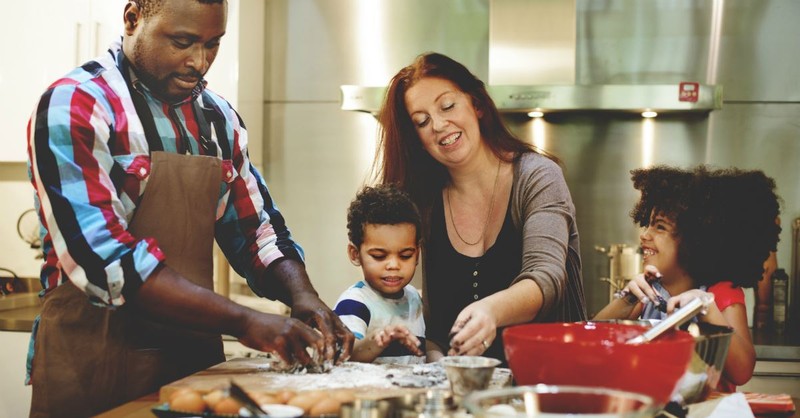
It happened again the other day: when an acquaintance at the neighborhood playground threw a plastic water bottle into a trash can, I reached down, plucked it out and dropped it into the blue recycling bin two feet to the left.
“You’re such a hippie!” She said, a smile spreading across her face.
“Yup, I guess you could say I am,” I replied, laughing.
To be honest, caring for creation feels like an innate part of my identity. Growing up in the Pacific Northwest, we couldn’t not talk about how to best protect and care for the environment, so, we talked about it at home and at school. We talked about it on Wednesday nights and Sunday mornings at church, a ragamuffin group of Jesus misfits committed to stewarding the most bountiful and delicate gift God had entrusted us with: the earth.
A few decades later, I can’t help but realize how the ideals my youth have continued to impact the way I live, parent and operate in the world today. But it makes me wonder: is it the same for everyone else?
Regardless of your upbringing or of where you live today, caring for the environment is something all of us can actively take steps to implement in our households. As such, here are ten simple changes you can make today:

1. Change the Way You Lunch
How many of us are in the business of packing school lunches for our children every morning? Instead of packing individual sandwiches, snacks and vegetables in plastic baggies, invest in a reusable Bento Box that can be cleaned out every night. This insulated Bento Lunch Box is a favorite in our home, and we also really like this Lunch Cube To-Go container. (Of course, if you can’t get away from baggies, there are a number of options of reusable sandwich bags on the market, including this favorite 6-pack). Also, if you’re just starting to implement change into a child’s routine, be sure to gently remind him or her not to throw everything in their lunchbox away, but to come home with all of the reusable items!
2. Make It Fun for the Kids
While change doesn’t happen overnight, as you take small steps toward caring for creation, involve the children in your life! Going green in our household meant sitting down with my boys to figure out which reusable straws would help a smoothie or glass of juice taste best. Hint: these sixteen stainless steel straws, with scrub brushes and carrying pouch won, hands-down. We also went to a local fabric store and picked out a swatch of fabric to make cloth napkins out of (although, I’ll be honest, I also ordered a handful of ready-made cloth napkins from Etsy later that day). Also, if you come over to my house for dinner, you’ll notice hand-written signs by the resident seven and five-year-old boys for the trash can, the recycling bin and the compost bucket too.
©Getty/Westend61

3. Use Less Paper
Whether you call it reducing your carbon footprint or simply making a commitment to use less paper, each of these small steps makes a big difference! First, if you regularly use a printer, be sure to set it to print double-sided, as it’s an easy way to cut your paper use in half. Second, take a look at what’s inside your filing cabinets: I found this article quite helpful to know how long to keep certain documents, like tax returns and pay stubs. (And don’t forget, after you shred all the paper you don’t need anymore, be sure to pop all that shredded paper into the recycle bin!). Third, go paperless as much as possible. Instead of receiving bank statements in the mail every month, opt for digital reminders to arrive in your inbox. Instead of letting third-party catalogs clog up your mailbox, unsubscribe from mailings altogether and “give your mailbox a makeover.”
4. Invest in Environmentally Friendly Cleaning Products
A couple of years ago, I finally stopped purchasing one-time soap dispensers and committed to using refillable soap dispensers instead. (Need a place to start? I especially love this dispenser, and I fill it religiously with Mrs. Meyers Hand Soap Refill, which you can find most anywhere Mrs. Meyers products are sold). Otherwise, the biggest change we’ve recently made to our house is in the laundry room: I finally stopped using dryer sheets and started using wool dryer balls. Not only do dryer balls reduce electricity bills and appliance usage, but they also shorten drying time by up to 25 percent. Check out this article if you want to know more. Also, at the recommendation of a friend, we also began to use Dropps for our laundry and detergent needs; their motto, “Eco-responsible packaging, no unnecessary fillers + dyes, + FREE carbon neutral shipping” has been a game-changer for us.

5. Celebrate Meatless Mondays
I don’t know about you, but I grew up in a house that didn’t believe a meal was a meal without some kind of meat on the plate. While my parents have changed their eating habits over the years, one of the steps my own family has taken over the years is to commit to eating vegetarian at least once or twice a week. Whether this happens on a Monday, a Thursday or a Saturday, not only is this a healthy option for your body, but according to this article, “consuming a plant-based diet can benefit the environment … in the U.S., the Environmental Protection Agency estimates that livestock contribute(s) to more than one-third of methane emissions,” or global human-caused greenhouse gas emissions. If going meatless one day a week helps care for the environment in the long run, then I’m in!
6. Avoid Fast Fashion
We live in a world that practically begs us to buy and consume the newest and latest items, all of the time – but have you ever considered the impact all this newness has on the environment? When it comes to clothing, for instance, “a lot of water and chemicals go into manufacturing our garments,” one writer states. “Approximately 1,800 gallons of water are required to make one pair of blue jeans.” So, are there items in our households that deserve a dunk in the resident trash can? Absolutely. But when we think about caring for creation, we have to begin to be mindful of all we’re consuming. Think about it this way: we steward creation when we purchase one shirt we absolutely love that costs a little bit more, but that will last us a couple of years, instead of five shirts on the sale rack that we just kind of like, that’ll cheapen quickly and get thrown away by the end of the season. I’ve loved following fashion blogger Karla Reed’s journey toward avoiding fast fashion – check her out!

7. Buy and Sell Secondhand
Certainly, when it comes to clothing in general, an easy way to care for the environment is to buy and sell secondhand. Be sure to check out the local consignment scene in your area or host a clothing swap. Can’t find anything in your neck of the woods? Head over to an online consignment retailer, like Poshmark or Thred Up for numerous options to buy and sell. And, of course, this is not merely limited to clothing: Offer Up is a great local resource to buy and sell any item locally, and secondhand books can be found all over the place! (Powell’s is my personal favorite, for both new and used books).
8. Don't Turn Up the Heater
Apparently, I’m on a clothing kick here, but if you’re sitting inside and you start to feel cold, don’t turn up the heater. Instead, put on another layer of clothing! Don that pair of fuzzy socks your grandma knit you! Snuggle under a blanket! And while this goes without saying, if it’s rather hot in your house, instead of cranking up the AC another notch, consider taking off a layer of clothing. According to Energy.gov, “you can save as much as 10% a year on heating and cooling by simply turning your thermostat back 7°-10°F for 8 hours a day from its normal setting.” I don’t know about you, but that’s a lot of money to save per year!
9. Use Your Legs
Years ago, I read an article by a writer who’d committed himself to not driving his car one day a week. Even in the middle of winter, he planned accordingly, sometimes donning a cold-weather parka so he could make the trek to the local coffee shop or sometimes letting all of his meetings come to him as he worked from home for the day. As a single-car family, my husband and I oftentimes have to walk, take the bus or ride our bikes, more than one day a week – however it happens though, the opportunity to get out into nature and use our legs is never wasted. So, what would it look like for your family? After all, if everyone in the U.S. committed to not driving their cars for one day, one writer states “we would prevent approximately 3.5 million metric tons of CO2 emissions.”

10. Invest in a Favorite Reusable Water Bottle
In a way, I end with where I started: do yourself a favor and stop purchasing bottled water, period. While I oftentimes make it my personal mission to rescue fallen water bottles from public trash cans, the truth is that more than 80 percent of plastic water bottles end up in landfills – and the environmental impact extends far beyond the amount of space discarded bottles take up after the fact. For more information, this 2015 article, with accompanying illustration, is a game-changer. So, invest in a reusable water bottle, then fill it up with tap water, over and over again, repeat. (Need a place to start? This one that you can use for both hot and cold liquids is one of my favorites, as is this one too).
Taking steps to be kinder to the environment is not an impossible task, so pick one step your household can commit to taking over the coming weeks and see how it goes. After all, stewarding the earth – this most bountiful and delicate gift God has given us – really is a gift.
Cara Meredith is a writer and speaker from the San Francisco Bay Area. Her first book, The Color of Life: A Journey Toward Love and Racial Justice will release in February (Zondervan). You can connect with her through her website, Facebook, Twitter and Instagram.
Originally published Monday, 02 March 2020.








